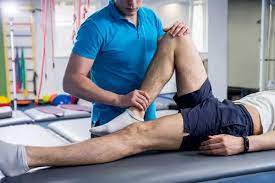The goal of integrated Physiotherapy Treatment in Greater Kailash 1, 2, 3, Delhi NCR care is to give patients a well-rounded, individualized treatment experience through in-clinic sessions, at-home visits, and digital care. The approach identies the distinctive qualities of every patient and customizes therapies for the best possible outcome and recovery

Advanced Physiotherapy Clinic is the traditional way of treatment. In this method,patients visit a physiotherapy clinic to get help from a licensed physiotherapist. The physiotherapist rst evaluates the patient's condition, such as paralysis, and then creates a personalized treatment plan based on the patient's specic needs and goals.

Physiotherapy Home Service involves a qualied physiotherapist coming to a patient's home to provide treatment. These visits are especially helpful for patients who can't go to a clinic because of mobility challenges or diculty with transportation. If someone has a head injury, home visits can be a more convenient and safer option for their physiotherapy treatment.

Digital care uses technology to offer physiotherapy services from a distance. It can include online consultations, exercise programs you can follow at home, and mobile apps that track your progress and give feedback. For people recovering from a stroke, digital care can be a convenient way to stay on track with their Physiotherapy Treatment.
Physiotherapy, or physical therapy, is a healthcare eld dedicated to improving physical function, mobility, and overall health. It helps individuals recover from injuries, manage pain, and prevent physical issues caused by medical conditions or trauma.Physiotherapists specialize in assessing, diagnosing, and treating physical problems.They use various approaches, including therapeutic exercises, hands-on techniques, electrotherapy, and patient education, to promote recovery and prevent further issues.
These professionals assist people across all age groups, addressing conditions such as musculoskeletal pain, neurological disorders, heart-related problems, and respiratory difficulties. PhysioAdviserIndia aims to support individuals in maximizing their physical abilities, ensuring they live a healthier and more active life.
PhysioAdviserIndia is equipped to help people dealing with neurological conditions,traumatic injuries, and various other health issues by managing their movements and alleviating pain. Our skilled professionals evaluate and apply techniques to enhance physical function. Discover how the Best Physiotherapist in Greater Kailash 1, 2, 3, Delhi NCR can assist you
Physiotherapy is effective in reducing pain. Techniques like massage, joint movements,and exercises help ease pain in various parts of the body, especially for those with long-term conditions like arthritis and back pain.

Physiotherapists help you avoid injuries by correcting posture and addressing muscle weaknesses. They teach exercises to improve strength, exibility, and balance, lowering the risk of falls and other injuries.
Rehabilitation Physiotherapy helps you recover after an injury or surgery. Our physiotherapists create personalized plans to help you regain strength, mobility, and function in the affected areas, based on your specific needs.
People with conditions like stroke or multiple sclerosis can benet from neuro physiotherapy. It helps improve balance, coordination, and muscle strength, making day-to-day life more comfortable.
Physiotherapists assist athletes in preventing and recovering from sports injuries. They create tailored exercise programs to boost strength, exibility, and endurance, helping athletes perform better and stay safe.
Physiotherapy is helpful during pregnancy and after childbirth. It includes exercises that help pregnant women stay strong and exible, making delivery easier. After childbirth,physiotherapy helps new mothers regain their strength and mobility.
PhysioAdviserIndia offers a wide range of physiotherapy services:
The following are the core benefits for which physiotherapy has been proven effective in achieving optimal outcomes:
1) Pain Relief: Physiotherapy uses treatments like Soft Tissue Mobilization, Ultrasound,and TENS to help reduce or stop pain caused by conditions like arthritis, tendonitis, and muscle strains. These treatments also help bring back normal movement and stop the pain from coming back.
2) Avoiding Surgery and Medicine: While sometimes surgery is needed, physiotherapy can help avoid it by treating problems early. If surgery is needed, physiotherapy before and after the procedure can reduce problems and save money on medical bills.
3) Improving Strength and Coordination: Physiotherapy includes exercises that make the body stronger. It also helps the body move better by improving coordination with exercises and tools. This can help reduce problems like dizziness or diculty balancing.
4) Better Lung and Heart Function: Physiotherapy can help people who have had a stroke get their movement, balance, and daily activities back. Breathing exercises are also used to improve lung capacity and help blood ow better.
5) Treating Sports Injuries: Physiotherapists are skilled in treating common sports injuries like Golfers' Elbows, ACL tears, and hamstring strains. They create special recovery exercises to help you return to your sport safely and avoid getting injured again.
6) Helping with Age-related Problems: Physiotherapy helps treat health problems that come with age, such as arthritis, back pain, knee issues, and more. It is also helpful for conditions like osteoporosis and sciatica.
7) Restoring Movement and Mobility: Physiotherapy can improve movement if you have trouble moving because of an injury like a broken bone, tennis elbow, or muscle stiffness. It uses stretches and strengthening exercises to help you move better and regain your full range of motion.
8) Managing Diabetes and Blood Circulation Problems: Physiotherapy helps with pain caused by diabetes or circulation problems in places like the knees, back, and shoulders. It also provides exercise plans to help control blood sugar levels and teaches about problems like Diabetic Foot and Diabetic Neuropathy.
9) Supporting Women’s Health: Physiotherapy helps with health issues related to pregnancy, childbirth recovery, pelvic pain, and more. It also helps with conditions like bowel problems, breast cancer recovery, constipation, and fibromyalgia.
1. Search Online for Services: You can use search engines like Google or Bing to find contact details of top clinics and professionals in Greater Kailash 1, 2, 3, Delhi NCR
2. Get Referrals from Trusted Sources: Ask your family, friends, or healthcare providers for recommendations of good physiotherapists, osteopaths, or chiropractors.
3. Explore Social Media for Contact Information: Many clinics and practitioners have social media pages where you can easily nd their contact details.
4. Request Recommendations from Your Community: Check with your neighbors or acquaintances to see if they know of any reliable physiotherapy, osteopathy, or chiropractor near me in Greater Kailash 1, 2, 3, Delhi NCR.
5. Check Local Newspapers for Listings: Local newspapers often feature ads and listings of available physiotherapy, osteopathy, or chiropractic services in the area.
6. Reach Out via Email: Send an email to the clinic’s contact address listed on their website or social media pages.
Looking for a Best Physiotherapist in South Delhi so visit PhysioAdviserIndia who has experience treating patients with conditions similar to yours, has positive reviews from previous patients, and has a friendly and approachable demeanor.
When looking for a physiotherapy clinic, look for one that is clean, well-equipped, and staffed by qualified and experienced physiotherapists.
Yes, physiotherapy can be an effective treatment for chronic pain, helping to improve range of motion, reduce pain, and improve overall quality of life.
Yes, physiotherapy can be an effective treatment for sports injuries, helping to improve mobility, reduce pain, and prevent future injuries.
Yes, physiotherapy can be an effective treatment for neurological conditions, helping to improve mobility, balance, and coordination.
Some physiotherapy treatments may cause mild discomfort, but your physiotherapist will work with you to ensure that your treatment is as comfortable as possible.
The number of sessions of physiotherapy you need will depend on your condition and its severity. You can seek guidance from your physiotherapist regarding this matter.
Physiotherapists use a variety of treatments, including exercises, manual therapy, electrotherapy education etc..
It is recommended to put on loose and comfortable clothing that facilitates free and easy movement. Depending on your condition, your physiotherapist may ask you to wear specific clothing or footwear for your sessions.
The number of sessions you'll need with a physiotherapist will depend on your condition, its severity, and your individual goals. Your physiotherapist will be able to give you a better idea of how many sessions you'll need after your initial assessment and as you progress through your treatment.